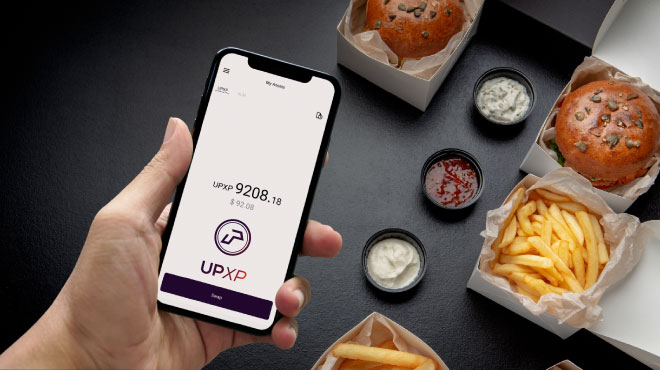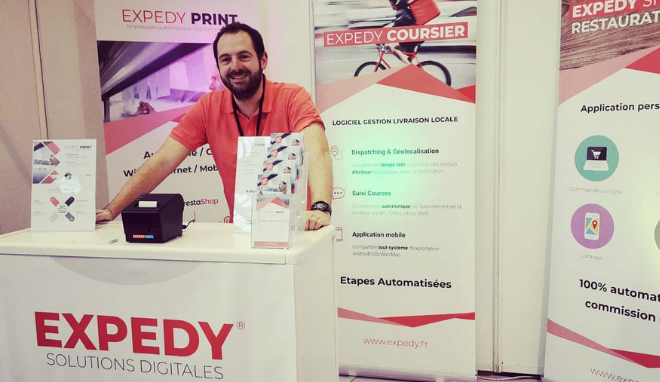

Anthony likes helping people reach their true potential. Being the victim of his own fears and insecurities in his own business, he has decided to help others create more opportunities.
The restaurant industry is moving fast. As people have realised that the one thing they can never make back is time, they value it like never before. For restaurants, the upshot is that customers are unwilling to accept any extended delays in food delivery or when processing their payments.
Today’s article features Muhammad Mehmood, COO of Andromeda, a leader in tailor-made POS softwares for restaurants in the delivery space.
Could you tell us a little bit about you and your role at Andromeda?
Before joining Andromeda, I had my own food delivery business in London. From the first unit created in 2002, we managed to grow within a short span of time by capturing the corporate market. Our delivery system went on to attract the interest of our competitors because we were consistently able to deliver within 30 to 35 minutes after customers had placed their order.
This is how I came to meet Ben Portsmouth, CEO of Andromeda, because I was a customer myself. Their software had previously allowed me to serve more people in less time thanks to the ease with which orders could be processed. Ben was interested in my field experience and my knowledge of the software as a consumer, so he asked me to join them, as a consultant initially. I am now the company’s COO and I oversee various international clients. I also regularly meet with partners and resellers.
So there are several sides to you: there’s the restaurant owner, then the consultant, and now the COO. How did it feel going over to the other side of the fence?
Actually, I learned a lot by being on the other side. As a customer, you’re quite demanding, and you think that you know your own needs better than anyone. Now I question customers. I want to know the logic behind their requests. I’m less critical of software businesses now that I understand the challenges involved.
I had no technical background at all, so stepping into the tech world was difficult at first. Today, if a customer faces a challenge, I understand it better thanks to my perspective as a former restaurant owner, and my immersion in the tech world. This understanding helps me to offer our customers tailor-made solutions.
So who are the big players in the POS industry and what challenges do you face?
Because of our different backgrounds, I don’t think we have any competition in the food delivery space. It’s easy to create a POS system, but not one that can tick all the boxes. Can it manage the drivers, the kitchen staff, the delivery times, the rack time, and how does it track all these metrics? These are just a few of the challenges we face.
With Andromeda you can track the drivers to estimate when they should be back for the next order. They can’t take a long break without you knowing about it either. It keeps everything moving much more smoothly.
We have also thought about takeaway collections. People don’t want to queue for 20 minutes when they only have 45 minutes for their lunch break. Contactless payment is therefore a must. Time is money for everyone. Ultimately, the more customers you can serve in the same amount of time, the more money you make.
Then you have the challenge of your labour costs. Our system can tell you what your expected sales are, and how much staffing you require to reach that amount. If you had to pay an operator for that, they would have to be extremely good to come up with the right figure. With our solution, you end up saving a lot of money.
And if we compare our software to some of the big players out there, it is much more flexible. A big company is obviously built for bigger markets and, as a result, they are not as flexible as we are. We have customers with more than 300 sites, and yet we are able to cater to their specific needs. Conversely, we also have more modest customers working from only one location, but we are able to cater to them as well.
And do you specifically target stores that include delivery?
As a business, our strength is food delivery. We also have very good solutions for takeaway, which I have experienced myself as a customer. The dine-in solution is robust too, but our strength is the delivery spectrum. I’m happy to say we have more than a thousand clients, with well-known brands such as Papa John’s, New-York Pizza, which is a big chain in the Netherlands.
Smaller chains like Firezza, which was recently acquired by Pizza Express, have also placed their trust in us.
In terms of future products, what will be the priority for you and your target market?
We want to be creative and think about what will happen twenty years from now, not just five years; that’s already history. In some countries drones are turning up with your order. The food delivery space is just as dynamic. With the arrival of Deliveroo and Uber, it is becoming a challenge for restaurants to pay drivers the minimum wage. In the last 2-3 years, restaurants have actually been struggling to recruit drivers because they were almost able to dictate their salary.
A lot of portals have emerged as well. Websites like Justeat and other players have entered the field. It’s the same with POS systems: we have a lot of copycats and some of them have done a pretty good job, I must admit. However, since they don’t know the basics of food delivery, they can’t really offer any viable solution.
Could you tell us something absolutely essential to know in the food delivery space?
When customers complain about not having enough business, I generally ask them to show me how long their food sits. Pizza, for example, deteriorates very quickly once it’s out of the oven. The longer it waits in the box, the less likely your customer is to order from you again.
There is one thing that is completely counterintuitive. When one of my investors told me to try it out, I thought it would never work. However, when I gave it a go, my sales went up 5 percent in less than three months, and the trend continued afterwards. And that trick is simply to send only one order per driver.
And does Andromeda have integrated online ordering solutions?
Yes, we have our own solution called Androweb, which is for people who just want a single web page from which customers can order. Since these clients generally don’t have much money to invest in a complex POS system, Androweb processes the orders and prints them automatically. For more specific needs, Livepepper is the expert so all our major chains have Livepepper. I was an early Livepepper customer as well.
At one of my stores in Crouch End, back in 2011, I had to have 6 telephone lines on Fridays and Saturdays and 6 people to man those calls. It was crazy. And simply by incentivising my customers to order online through my Livepepper page, I was able to reduce the number of people answering the phone to two. This is partly why I have had a long term relationship with Livepepper.
You talked about portals like Justeat. When I talk about Livepepper, people think it’s a portal.
How do you educate people about the difference between a portal and an online solution?
For any small restaurant starting out, getting through a portal like Justeat will give them more customers. What they don’t realise is that this spike is only temporary. Justeat will also integrate the restaurant next door. The database of clients they create belongs to them so you can’t contact these customers again unless you do something yourself to build your own brand awareness and your customer database.
You can’t ask these portals to market on your behalf because they will charge you premium for that. In the UK, it’s between 15 and 40% in the UK. That’s why the advice I consistently give is to go with these portals to start with, and then have your own online ordering solution.
How much does it cost for a restaurant owner if they want to go with Andromeda? Is there a lot of hardware to install? Is it a monthly fee? How does it work?
We offer different solutions tailored to the needs of customers and their budgets. Our POS system was designed to be compatible with most hardware. We don’t supply the hardware but you can buy something that fits your own budget. We can install the software on anything.
Since flexibility is very important for us, I can’t give you an exact price because you may want to purchase 10 licences or you may need only one screen. At the end of the day, the bigger the company, the more we need to accommodate their special requirements, which comes at a price because developers aren’t cheap. However, we make a point of tailoring our solutions as much as we can.
Final question, if I want to open my own restaurant, choosing a POS can be overwhelming. What are the top three criteria that I should consider?
Firstly, you need to understand which market you’re targeting. The key is to keep it simple. You need to understand whether your strength is delivery or just takeaway. Also, look at the ease of reference, and the ease of the payment process. Finally, have a look at employee management. People forget tend to overlook this aspect, but it’s a key factor. As a consultant, I always ask them these questions first.
One of our clients didn’t know what their best-selling product was. In fact, this is one of the features in our software, which provides you with sales reports. That way, you have an understanding of what’s selling and what’s not. There’s no point in keeping twenty menu items that hardly sell. Andromeda can give you a prediction of your inventory needs based on your sales history. That will avoid you the painful experience of a manager who orders too much and pushes you to deal with unnecessary waste.
Wrap-up
Food delivery is a little more complicated than just hiring drivers. Delivering quality food that people won’t forget is quite a challenge. With a POS system that specialises in food delivery, you can make the whole process smoother. We want to thank Muhammad Mehmood for giving us his invaluable insights into the delivery business.







Comments